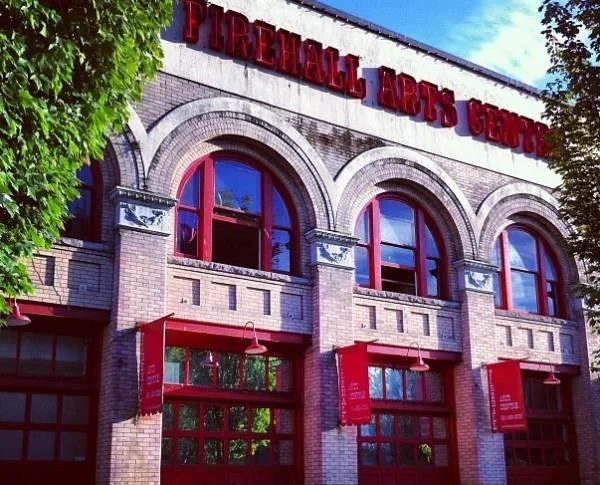Firehall Arts Centre loses bid for $7 million accessibility upgrades in City's Mid-term Capital Plan
In a move opposition councillors called “embarrassing”, Vancouver City Council majority voted to put off exploring future upgrades to the aging facility by two years
Currently, wheelchair users have to try to fit into a side door at the Firehall Arts Centre.
CITY COUNCIL TODAY voted against supporting the Firehall Arts Centre’s bid for $7 million in the Mid-term Capital Plan for 2023-26 for long-needed accessibility upgrades.
As reported by Stir earlier this week, patrons and artists who use wheelchairs cannot enter the theatre entrance from the more-than-a-century-old building’s box office, as it has stairs. Instead, they have to try to enter through a side door that does not accommodate most larger motorized chairs. A trip to the bathroom requires a Firehall staffer to roll the audience member across the stage at intermission and down a corridor past the dressing rooms.
The Firehall has been calling for the accessibility upgrades for more than a decade, over three capital plans.
The City, which owns the 117-year-old building, received more than 200 letters in a campaign of support from patrons for the Firehall plan. It would have seen an elevator installed at the courtyard end of the building, new ramps and accessible washrooms, dressing rooms brought up to industry standards, and the door into the theatre lowered to entrance level.
Instead, the ABC majority, including Mayor Ken Sim, voted in favour of Coun. Mike Klassen’s amended motion to direct staff to “explore adding funds to the 2026-29 capital plan for infrastructure and accessibility upgrades”, with a look to provincial and federal levels of government to help finance a bigger project. Coun. Christine Boyle, Adriane Carr, and Pete Fry opposed the new motion; Coun. Sarah Kirby-Yung was absent.
“This is going to take a lot more than $7 million to turn this into the Class A arts and performance facility that it deserves to be,” Klassen said, arguing in favour of the further delay. “We should come back to this probably in less than two years’ time.”
“Delaying these funds by two or more years increases the uncertainty for the organization—it will undoubtedly result in escalating costs, so that the $7 million we could commit now will go a lot less far,” Boyle said. “This is a project that we should not continue to delay.”
Of Klassen’s motion, Boyle said, “It could not be more vague and weak,” and “more and more performers and staff will not have the dignity they deserve”.
She added: “To continue punting this down the road is embarrassing and incredibly disappointing.”
Coun. Fry added the process made “a mockery of public input”, pointing out neither Firehall artistic producer Donna Spencer nor the public was allowed to speak to it today in council.
In an interview with Stir following the decision, Spencer lamented the fact that the upgrades to make the Firehall properly wheelchair-accessible could take five or six years—even if it gets included in the next capital plan. She traces the Firehall’s first request for the fixes back to 2009.
“Here we are, sitting here with the problem we’ve had forever,” she said. “It’s not a very progressive approach from my perspective.”
Spencer is now rallying supporters to turn out to City Council June 23 when it allows speakers as it formally approves the Mid-term Capital Plan.
“Although it’s almost predetermined, we will be working to speak to this,” she said. “We’re also reaching out individually to councillors to say ‘Can you individually consider what this means?’ Block voting happens all the time but sometimes someone is brave.”
Although the Firehall has long needed larger renovations—the latest estimate is $30 million for full infrastructural upgrades—Spencer said making an immediate move to bring the facility up to accessibility standards had been planned to be integrated into any bigger plans.
“We pulled back to say, ‘This is the piece that makes it crucial to our operations,’” she said, adding an investment in this phase of the project would help convince senior levels of government to back Firehall upgrades.
Klassen argued in favour of the delay in chambers, saying it was “important we have a clear-sighted vision”. “We definitely have to consider all our arts and performance spaces, which we have a lot of pressure on right now,” he added. “All of them are having some level of challenge right now.”
When Klassen suggested there wasn’t an “actual plan brought forward” by the Firehall, Fry reconfirmed with city staff that a proper feasibility study had identified the need for $7 million to meet “the most extreme needs for access in that centre”. ![]()














